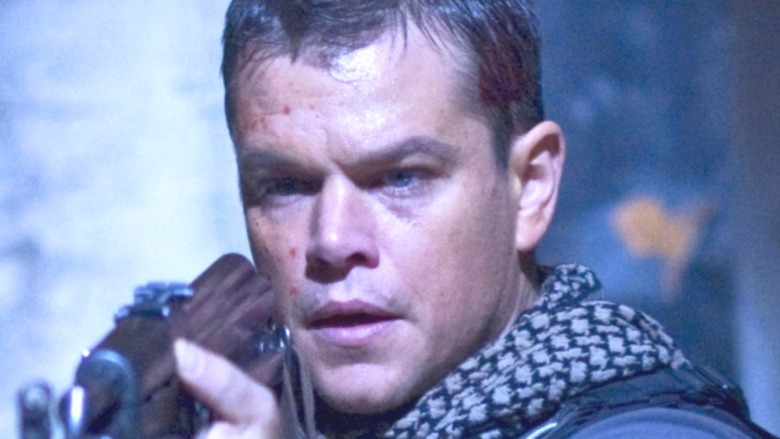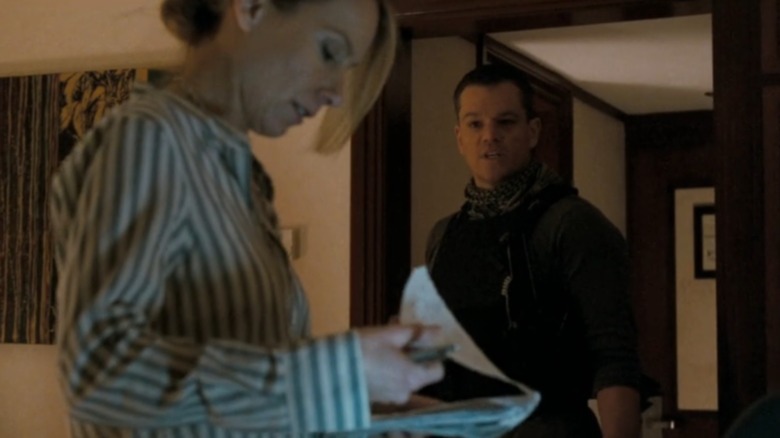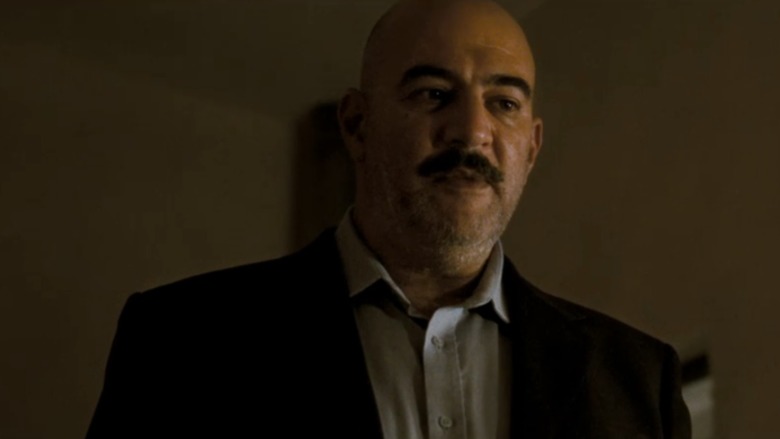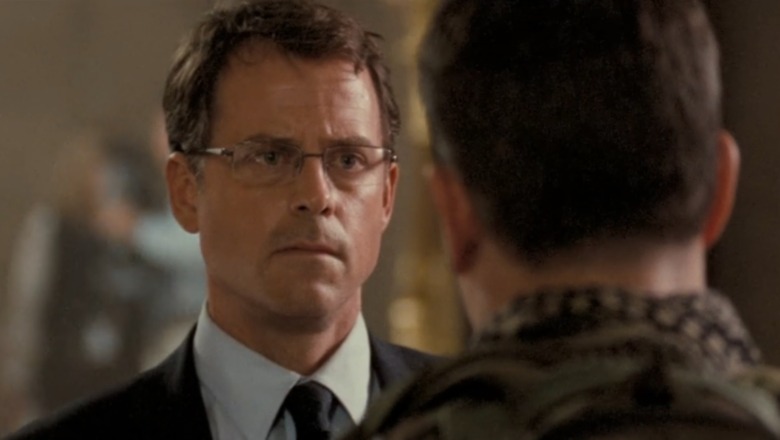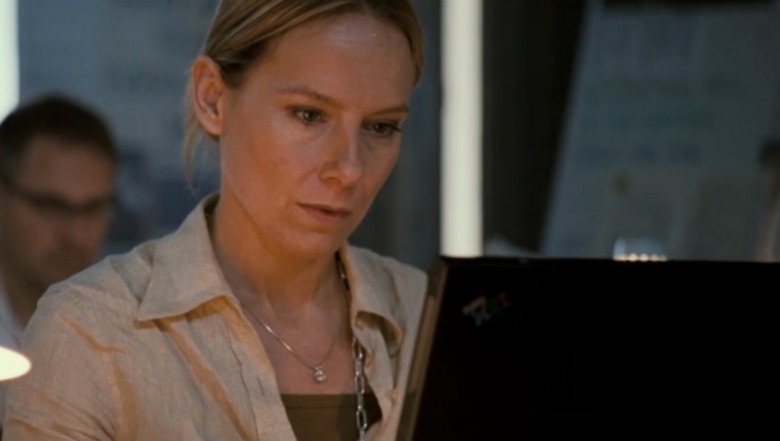The Ending Of Green Zone Explained
The 2010 war thriller "Green Zone" sees Matt Damon teaming up with "The Bourne Ultimatum" director Paul Greengrass for a gripping look at the political machinations behind the Iraq War. From the nerve-rattling action set pieces to the uncovering of a twisted government conspiracy, the movie revisits many elements that made Damon and Greengrass' previous collaborations so successful. That's also true of the story's explosive ending.
In the film, Damon plays Roy Miller, an officer with the U.S. Army during the early days of the Iraq War. Miller is frustrated after his unit is sent on several failed missions to sites that supposedly contain evidence of Iraqi weapons of mass destruction (WMDs), the alleged existence of which were a key reason that the U.S. invaded the country in the first place. When he tries to question the intelligence being used in these WMD hunts, he's told to stop asking questions and keep doing his job.
While Clark Poundstone (Greg Kinnear), an official with the U.S. Department of Defense, assures him that they are close to finding the elusive WMDs, a CIA agent named Martin Brown (Brendan Gleeson) reveals that he shares Millers' concerns. With Brown's assistance, Miller begins tracking down an Iraqi general named Mohammed Al-Rawi (Yigal Naor) who may have the answers he's seeking.
Dayne realizes she's been lied to
As Miller follows the trail of clues, he meets journalist Lawrie Dayne (Amy Ryan), who wrote several stories for the Wall Street Journal based on a report detailing a meeting between U.S. officials and an Iraqi whistleblower referred to as Magellan. Her reports state that the whistleblower confirmed that Saddam Hussein's regime did indeed have WMDs. However, as Miller has personally been to many of the sites that Magellan claims contained evidence of the production of WMDs and found nothing, he knows that she was lied to.
Miller grills her about who gave her this information, but Dayne will only reveal to him that it was a high-ranking government official who showed her the intel that Magellan allegedly gave the U.S. Based on scenes earlier in the movie, it's clear that her source was Poundstone. Dayne didn't question or verify the information he gave her because she believed that his senior position meant he was trustworthy. However, as Miller soon proves, that couldn't be further from the truth.
Meanwhile, Poundstone has been hunting down Al-Rawi, who has been hiding in a series of safe houses around Baghdad. Miller manages to find the general first and learns exactly why Poundstone has been looking for him.
Miller and Al-Rawi meet
After a long search, Miller finally comes face to face with Al-Rawi, who is revealed to be Magellan. The general tells Miller that contrary to the information Poundstone disseminated, Al-Rawi told U.S. officials that there were no WMDs in Iraq and that the country had ended production of them in the early '90s. Miller tells Al-Rawi that he wants to bring him in to tell his version of events. However, Miller is clearly still clinging to some amount of idealism regarding the situation that Al-Rawi doesn't share.
Al-Rawi asks Miller, "Did anyone verify [Poundstone's] story?" The question is rhetorical and meant to imply that if anyone in the government had actually been interested in getting the facts straight, it would have been easy for them to do so. Instead, as Al-Rawi states, "Your government wanted to hear the lie, Mr. Miller. They wanted Saddam out and they did exactly what they had to do."
Again, Miller tries to convince Al-Rawi to come in to share his truth, but the general already sees the writing on the wall. Shortly before their meeting, the U.S. government disbanded the Iraqi army, putting the general in a precarious position. Al-Rawi explains that when he came forward with his information, he was told he'd have a place in "the new Iraq." However, he now realizes that he was used as a pawn for Poundstone and his associates and will be disposed of the first chance they get. Whereas Miller still believes exposing the truth will resolve things, Al-Rawi understands that the people behind the lie have no intention of letting that happen
Poundstone's deceptions are exposed
Miller's meeting with Al-Rawi puts things into a much clearer perspective. At the beginning of the story, he was merely trying to speak up about what he saw as a failure of intelligence. Now, though, he realizes that not only did Poundstone purposefully lie about the meeting with Al-Rawi, he also fed the false information to the media in order to help give further legitimacy to the claims that there were WMDs in Iraq.
In getting to the bottom of this scheme, Miller also exposed how Poundstone was able to get away with his lie for so long. Throughout the film, Miller is told by his superiors in the army to shut up and do his job. That fealty toward high-ranking officials like Poundstone kept the story from being questioned. It's not until Miller goes against that hegemony that he's able to uncover the truth.
After Miller writes his findings up in a report, he personally delivers a copy of it to Poundstone and confronts him about his lies. Poundstone incredulously tells him, "Come on, none of this matters anymore. WMD? This doesn't matter."
Throughout the film, we see that Poundstone has ambitious plans for how he and his associates will reshape the future of Iraq now that the U.S. has overthrown its government. The lie about the WMD intel was nothing more than a tool to help achieve that goal. When he tells Miller that the question of WMDs "doesn't matter," he's speaking truthfully for once. He's no doubt unhappy to be exposed, but as far as Poundstone is concerned, the alleged existence of WMDs only mattered insofar as they would provide a reason to invade the country. His lie already served its purpose.
The meaning behind Green Zone's ending
After the confrontation, we see Poundstone attending a meeting with Iraqi political leaders that has descended into chaos. The assembled men are arguing with each other voraciously, which is perhaps the movie's way of demonstrating how serious the implications of Poundstone's lies are. Throughout the film, various characters reference the goals of the U.S. invasion, with most pointing to the desired end result being an orderly and efficient new democratic government for the country. But as the meeting demonstrates, it's folly to assume that would be achieved by simply deposing the former government and installing a new one in its place. Poundstone's lies broke something that cannot be easily fixed.
At the very end of the film, Miller leaks his report to the press, including Dayne. She reads his email with a hopeful look in her eye. Similar to the film's commentary about the role that military hegemony played in helping Poundstone's lie gain traction, it also appears to be calling into question the media's role in propagating that mistruth. While Poundstone is the person at the center of the malfeasance, he had help from many unwitting actors along the way. Dayne didn't realize she was one of them until it was too late.
Ultimately, the ending of "Green Zone" is a bittersweet one. Miller is able to expose Poundstone's lies, but they have already done immense damage to the people of Iraq. And although the film fictionalizes many characters and events to tell its story, it does accurately depict how the specter of Iraqi WMDs was used as a pretense for invasion and the fact that no evidence of those WMDs was actually found (via USA Today).
